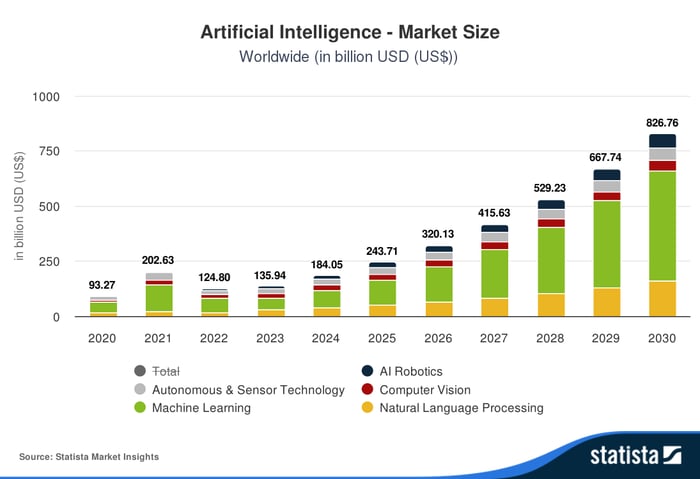The bull market on Wall Street persists, aided by stocks like Nvidia and Microsoft, which are posting tremendous results on the back of the artificial intelligence (AI) boom. Knowing when to invest with the market near all-time highs is difficult. Many people feel the bull market will continue with a perceived business-friendly incoming administration and Big Tech investments in AI. These companies are forecast to pour $250 billion into capital expenditures next year alone. And, as shown below, revenue from AI could exceed $820 billion by 2030.

Chart by Statista.
This doesn't mean stocks will continue rising; there are always risks. I'll discuss buying strategies in a bull market below. But first, here are two very different companies that could each provide excellent long-term returns.
Dell's enormous data center opportunity
NYSE: DELL
Key Data Points
The number of hyperscale data centers (those over 100,000 square feet) eclipsed 1,000 this year, and the forecast is for at least 120 to come online annually for the foreseeable future. These massive centers, some over 1 million square feet, need infrastructure like servers. Dell (DELL 3.97%) is a market leader in this area. Dell's Infrastructure Solutions Group recorded record revenue last quarter, $11.6 billion, with 38% growth. The company's total sales increased 9% to $25 billion for the quarter.
Dell believes its addressable market in AI will be $124 billion and its total infrastructure market $265 billion by 2027. Recent developments at its competitor Super Micro Computer likely mean Dell will capture even more of this market than previously expected. Supermicro is reeling from a short report, delayed financial filings, and the resignation of its auditors. Its public struggles should benefit its competition. As evidence, analysts have been busy raising their Dell price targets this month.
Wells Fargo raised its target from $140 to $160 per share, while Morgan Stanley raised its target from $136 to $154. The targets are 7% to 11% above the current price; however, if Dell continues to dominate the server market, analysts will likely raise them again. Shareholders also benefit from a dividend and share buyback program that returned a combined $1 billion last quarter. Dell expects to increase its dividend by 10% annually through at least fiscal 2028. The AI opportunity, competitor struggles, and rising price targets make Dell a tempting stock to own for the next several years.
Amazon's gigantic data processing opportunity
NASDAQ: AMZN
Key Data Points
Moving from a company that supplies data centers to one that builds them leads to Amazon (AMZN -1.62%). For instance, construction has begun on Amazon's $11 billion data center in Indiana. These centers are key to increasing the processing and storage capacity of Amazon Web Services (AWS).
Some people still think of Amazon as a product company, but AWS is the straw that stirs Amazon's drink. The segment accounted for 60% of Amazon's $60.5 billion operating income over the last 12 months. It posted an extremely impressive operating margin of 38% last quarter compared to 5% for the other two segments combined.
As shown below, Amazon's operating cash flow exploded with a lot of help from AWS.
AMZN Cash from Operations (TTM) data by YCharts
Amazon stock trades below its five-year averages based on sales, operating cash flow per share, and earnings, a rarity in today's record-setting market.
So, what's the best way to invest in a raging bull market? Investing at the top of a market is risky, but it's important not to try to time the market. Just because the major indexes are near all-time highs doesn't mean they can't go higher. Here are two strategies to mitigate risk.
First, consider dollar-cost averaging -- accumulating shares over several months. This allows you to take advantage of declines in the stock price and limits the risk of buying at a market top. Or, consider a "buy-the-dip" strategy. The market frequently experiences corrections (declines greater than 10%); however, we haven't experienced one in 2024, although there was one in 2023, four in 2022, and five in 2020. However you choose to invest, consider Dell and Amazon for a piece of the AI market.





